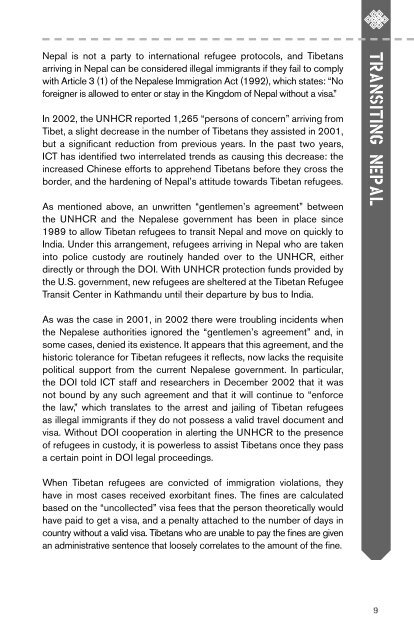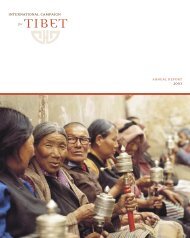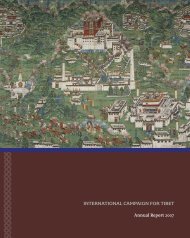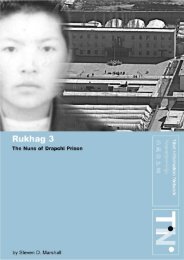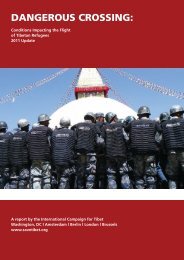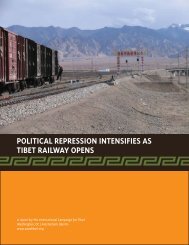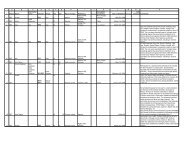download the report - International Campaign for Tibet
download the report - International Campaign for Tibet
download the report - International Campaign for Tibet
- No tags were found...
Create successful ePaper yourself
Turn your PDF publications into a flip-book with our unique Google optimized e-Paper software.
Nepal is not a party to international refugee protocols, and <strong>Tibet</strong>ansarriving in Nepal can be considered illegal immigrants if <strong>the</strong>y fail to complywith Article 3 (1) of <strong>the</strong> Nepalese Immigration Act (1992), which states: “No<strong>for</strong>eigner is allowed to enter or stay in <strong>the</strong> Kingdom of Nepal without a visa.”In 2002, <strong>the</strong> UNHCR <strong>report</strong>ed 1,265 “persons of concern” arriving from<strong>Tibet</strong>, a slight decrease in <strong>the</strong> number of <strong>Tibet</strong>ans <strong>the</strong>y assisted in 2001,but a significant reduction from previous years. In <strong>the</strong> past two years,ICT has identified two interrelated trends as causing this decrease: <strong>the</strong>increased Chinese ef<strong>for</strong>ts to apprehend <strong>Tibet</strong>ans be<strong>for</strong>e <strong>the</strong>y cross <strong>the</strong>border, and <strong>the</strong> hardening of Nepal’s attitude towards <strong>Tibet</strong>an refugees.As mentioned above, an unwritten “gentlemen’s agreement” between<strong>the</strong> UNHCR and <strong>the</strong> Nepalese government has been in place since1989 to allow <strong>Tibet</strong>an refugees to transit Nepal and move on quickly toIndia. Under this arrangement, refugees arriving in Nepal who are takeninto police custody are routinely handed over to <strong>the</strong> UNHCR, ei<strong>the</strong>rdirectly or through <strong>the</strong> DOI. With UNHCR protection funds provided by<strong>the</strong> U.S. government, new refugees are sheltered at <strong>the</strong> <strong>Tibet</strong>an RefugeeTransit Center in Kathmandu until <strong>the</strong>ir departure by bus to India.TRANSITING NEPALAs was <strong>the</strong> case in 2001, in 2002 <strong>the</strong>re were troubling incidents when<strong>the</strong> Nepalese authorities ignored <strong>the</strong> “gentlemen’s agreement” and, insome cases, denied its existence. It appears that this agreement, and <strong>the</strong>historic tolerance <strong>for</strong> <strong>Tibet</strong>an refugees it reflects, now lacks <strong>the</strong> requisitepolitical support from <strong>the</strong> current Nepalese government. In particular,<strong>the</strong> DOI told ICT staff and researchers in December 2002 that it wasnot bound by any such agreement and that it will continue to “en<strong>for</strong>ce<strong>the</strong> law,” which translates to <strong>the</strong> arrest and jailing of <strong>Tibet</strong>an refugeesas illegal immigrants if <strong>the</strong>y do not possess a valid travel document andvisa. Without DOI cooperation in alerting <strong>the</strong> UNHCR to <strong>the</strong> presenceof refugees in custody, it is powerless to assist <strong>Tibet</strong>ans once <strong>the</strong>y passa certain point in DOI legal proceedings.When <strong>Tibet</strong>an refugees are convicted of immigration violations, <strong>the</strong>yhave in most cases received exorbitant fines. The fines are calculatedbased on <strong>the</strong> “uncollected” visa fees that <strong>the</strong> person <strong>the</strong>oretically wouldhave paid to get a visa, and a penalty attached to <strong>the</strong> number of days incountry without a valid visa. <strong>Tibet</strong>ans who are unable to pay <strong>the</strong> fines are givenan administrative sentence that loosely correlates to <strong>the</strong> amount of <strong>the</strong> fine.9


